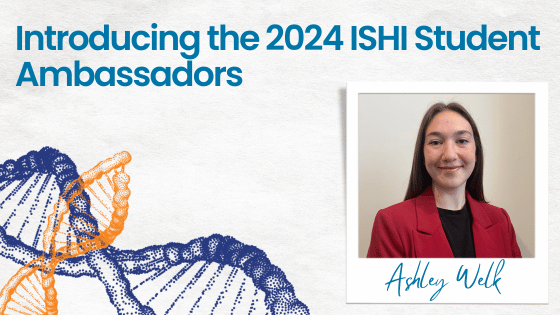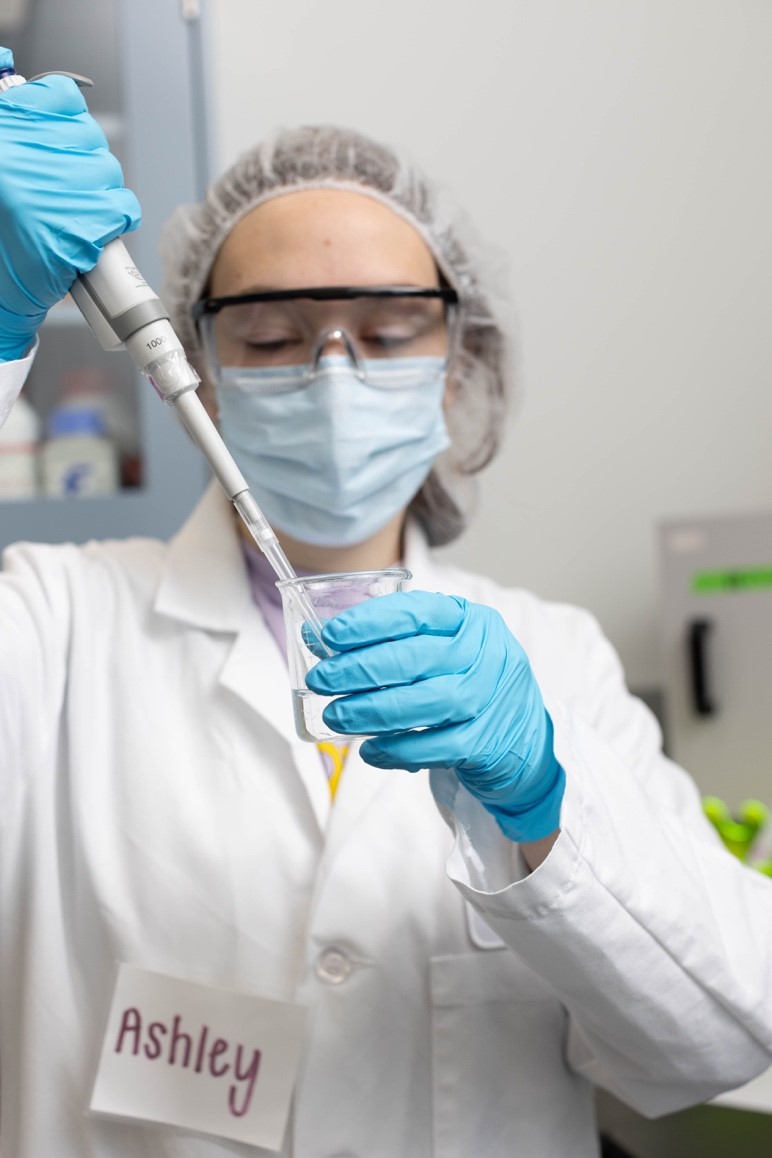Ashley Welk’s path to forensic science started on a take your daughter to work day. Ashley’s father brought her along to his lab, and let her wear a long, white lab coat that draped to her feet, along with goggles and gloves that were much too big. Ashley felt like a real scientist and after that experience knew she wanted to be in that environment in the future.
Flashing forward to high school, Ashley took a biology class with an instructor, Mr. Kenney. He taught a genetics unit and mentioned the application of genetics in the forensic field which interested her greatly. As she looked toward university, she decided to pursue forensic science and biology at Marian University of Wisconsin largely because of his influence.
During Ashley’s time at Marian, she learned the importance of the intersection between science and the criminal justice system, and she wanted to build on that knowledge with further education. This led her to begin her Master of Forensic Biology with Thomas Jefferson University, where she us currently in her second semester.
Ashley recognized Jefferson as an environment where she could develop and evolve into a scientist capable of enduring the challenges and demands of a forensic science career, primarily due to their collaboration with the Center for Forensic Science Research and Education (CFSRE), a non-profit dedicated to research, education, and outreach in the forensic sciences. It was her program director, Dr. Mirna Ghemrawi, that encouraged her to apply to be an ISHI student ambassador as she was among the first ambassadors.
Throughout her time with the CFSRE, Ashley has processed mock cases, as well as assisted with ongoing forensic biology projects. These experiences have prepared her for a career in the field and have sparked a further interest in research.
We caught up with Ashley and asked her to tell us a little more about herself, including how she became interested in forensic science, what she plans to do after graduation, and what she’s most looking forward to at ISHI this year.

What are your specific areas of interest within forensic DNA analysis?
I am interested in many aspects of forensics DNA analysis, but a specific area that sticks out to me is mitochondrial DNA analysis. Forensically relevant samples like bones, teeth, and hair which may not yield high nuclear DNA, are often processed for mitochondrial DNA. Mitochondrial DNA is maternally inherited and gives analysts an increased set of information beyond the nuclear genome which can be utilized for identification of human remains, ancestry, and so much more.
What are some of the latest developments or technologies in forensic science that excite you the most?
The development of Next Generation Sequencing technologies has been very exciting to witness throughout my education. I am fortunate to get hands-on experience with the MiSeq FGxTM instrument during my graduate research and the capability to generate whole genome sequences within days is something I will always be in awe of.
Who in the field of forensic science do you most admire and why?
One person I admire in the field of forensic science, although he died in 1966, is Dr. Edmond Locard. Locard’s principle regarding transfer of trace evidence was and still is fundamental to every aspect of forensic DNA analysis from crime scene investigation through all steps of DNA processing.

What's the most interesting thing you've learned so far in your forensic science studies?
The most interesting thing I have learned in my studies so far has been the concepts and principles behind instrumentation fundamental to forensic DNA analysis ranging from thermocyclers to Next Generation Sequencers. It is important to be able to use an instrument, but I think it is just as important, or maybe more so, to be able to understand the biological and chemical processes that these instruments employ. I find these processes extremely interesting, and it amazes me how complex and elegant the technology can be.
How do you handle stress or pressure, especially when dealing with challenging studies or research?
The biggest way I deal with stress from studies and research is through exercise. I play soccer in a co-ed league in the Philadelphia area on Sundays, and I frequently run after work and class at a local trail. I find that getting outside and moving always makes my day better.
What's one thing you're hoping to learn from your experience as a Student Ambassador?
One thing I am hoping to learn from my experience as a student ambassador is how to take my academic experience and translate it into a viable and meaningful career in forensic DNA analysis. There are countless experienced and talented scientists that will be present for the symposium, and I want to ask for as much advice as possible. Other than that, I am excited to attend workshops and learn about important topics like Bayesian statistics, and Forensic Investigative Genetic Genealogy.
What are your aspirations for the future after completing your education?
After completing my M.S. in Forensic Biology I would love to continue to participate in research that pushes the field of forensic biology in a positive direction. I am currently deciding whether to pursue a move up to Canada, so I will be looking into research universities as well as government forensic science facilities in the Toronto area.

